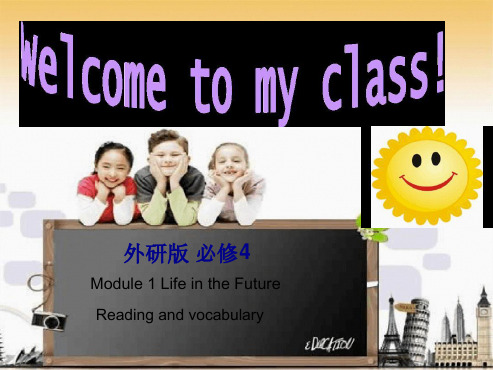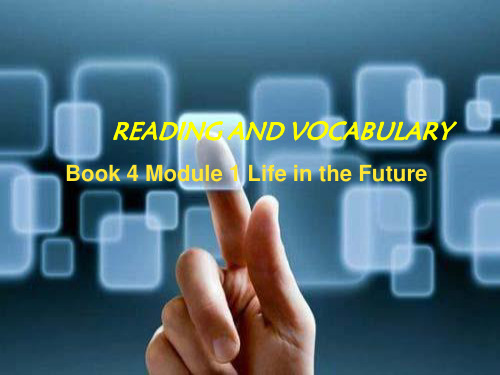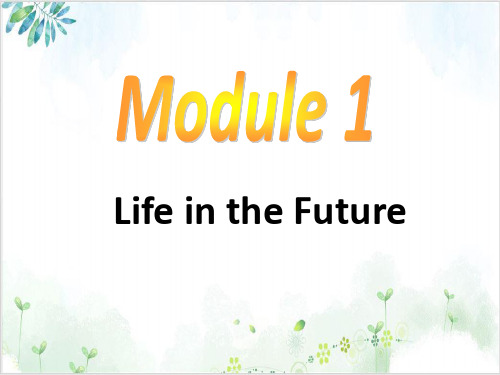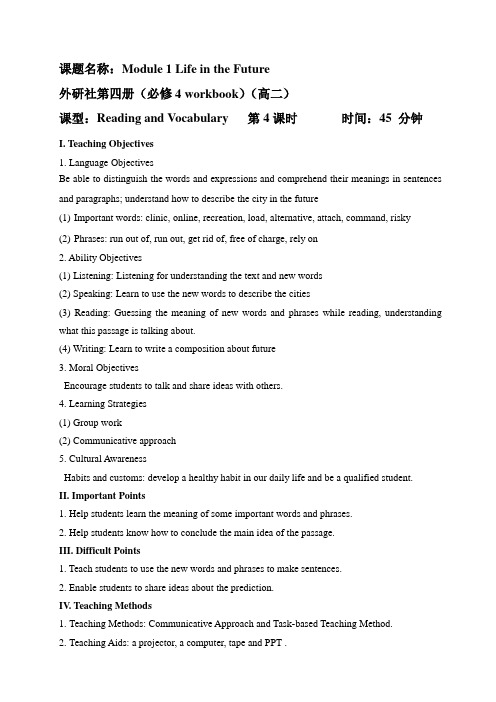外研高中英语必修4Module1ReadingandVocabularyPPT优秀课件44
外研 高中英语必修4Module1Reading and vocabulary共21张

(1) Read the passage quickly and find
out the topics mentioned in the passage.
□■ alternative energy □■ crime
□schools
□■ public service
□■ shopping
□■ environment
Step 2:Prediction
Read the title and describe the
picture on Page 2 and make predictions
about what the passage will take about.
Step 3: Reading
1.Fast reading
and describe your future life to each other from the perspective of
family, work and hobbies.
Step 4: Summary Step 5: Homework
Homework:
1. Read the passage after class.
Part two: Para 2-12---predictions for
specific aspects of the
future life.
2. Intensive Reading
Part 1: Qs and As
1) Why is making predictions a risky business?
important as earth's natural
resources run out. We will use lots
外研 高中英语必修4Module 1Reading and vocabulary(共23张PPT)

Please read the passage quickly and check your answers. 1. Which topics are mentioned in the text? 2. How many parts can the passage be divided into?
alternative energy
Part 2 Young people’s opinions (Para.2-12) about future city life
While-reading Reading for specific information and inferring
Part 1(para.1)
1. Why should we care for the environment in the future?
The City of the Future?
Pre-reading
Let’s go traveling in the future like the mechanic cat“Doraemon”.
Predicting
Pre-reading
The City of the Future
Which topics do you think will be mentioned in the passage with the title above?
While-reading
Reading for specific information
Part 1(para.1)
1. Why should we care for the environment in the future?
Because the earth’s natural recourses run ouara.3-12)
Reading and vocabulary优秀课件

4. Which of the following is the closest in meaning to the phrase “give away” in the last paragraph? A. Give sb. sth. for free. B. Throw away. C. Give up. D. Make sth. known to sb.
Scanning
A 1.Europeans and
Americans 2. American youths 3. Chinese 4. Muslims 5. Hindus
B a. Touching their heart, mouth and forehead b. Shaking hands with their right hands c. Joining their hands and bowing their heads in respect d. Putting the right hand over the left and bowing slightly e. Greeting each other with the expression, “Give me five!”
Decide whether the statements are true (T) or false (F).
(1) Not all body language is conscious. ( T ) (2) Europeans shake hands with their left
hand. ( F ) (3) In Asia, people touch strangers when
they meet. ( F )
(4) In the US a “high five” is a way of saying hello. ( T )
外研必修4 Body language Reading and Vocabulary

deal is a business agreement. 6. A (n) ____
gesture is a movement of the body to communicate something. 7. An _______
trust someone you believe them and rely on them. 8. If you _____
Module 3 Body Language and Non-verbal Communication
Reading and Vocabulary
Lead-in
Look at the following pictures and guess what we will learn in the class.
Para 4 Para 5
American youth’s greeting today
Explaining
1. Not all body language is conscious. T
2. Europeans shake hands with their left hand. F
3. In Asia, people touch strangers when they meet. F 4. In the US “a high five” is a way of saying hello. T 5. A “high five” is a formal gesture. F 6. Body language is less communicative than spoken or written language. F
1 Saying It Without Words
2 When in Rome, Do as the Romans do 3 Greetings Around the World 4 Read My Mind
外研 高中英语必修4Module 1 reading and vocabulary(共24张PPT)

2、为了生活更美好,我们将更加努力的学习。 To create a better life, we will work harder and harder.
Homework: Write a full passage about your ideas of your future life. Write at least 100 words.
5. How will the police arrest the criminals?
By firing nets
6. What will cars be powered by?
Electricity,solar and wind
7.How will people go shopping?
Online 8.What number will people keep for life?
Because our earth's natural resources are running out.
Reading part 2 carefully. Ask and answer the following questions with your partners.
1.Where will garbage ships go?
Detailed-reading:
Read part 1 carefully and answer the questions. 1. Is it an easy thing to predict the future?
No, because it is a risky thing. 2.Why will care for the environment become very important in the future?
Reading and vocabulary1 外研版高中英语必修一第一课教案

1教学目标知识于能力:1、阅读中能识别所学词汇和短语并推断出意义;2、运用所学口头表达因特网的迅猛发展及其在现代交际中的使用。
过程与方法:1、通过阅读,掌握文章大意,能过完成就文章教师所提出的问题。
2、通过讨论辩论的方法加强学生对因特网的进一步了解。
3、在阅读过程中不断提取并加工有效信息、提高阅读效率。
情感态度与价值观:1、学生学会客观、辩证地看待因特网和现代电信设备,积极利用这些资源获取和处理有用信息2、使其为自己的生活和学习服务。
避免沉迷于电子游戏而荒废学业2学情分析这是高一的新生,学习热情比较高。
虽然有的同学英语基础比较薄弱,但在教学过程中通过设置难易不同的问题,让每一位学生都能有展现自我的机会,从而对英语产生兴趣。
而基础较好的同学,可以回答阐述自我观点的问题。
3重点难点重点:分析课文,提高学生的阅读能力及语言表达能力。
难点:帮助学生了解因特网的发展并使学生能自我阐述其发展的过程4教学过程4.1第一学时新设计I lead in(To arouse students’ interest)T: Look at the picture on the screen. What is it?Ss: computer.T: Yes. Today we are going to learn about the development of the Internet. First I will divide you into two groups. Every group chooses one of students to answer t he questions on the screen. There are 9 questions. Every group chooses one of th em to answer.S: Number 1: What does PC stand for? It stands for personal computers.T: Good, you are right. Your group will get one mark.S: Number 3: What does IT stand for? Er… Information Technology.T: Right. Next group.S: Number 9. When was the first computer invented? Sorry, I don’t k now.T: Sorry, your group can’t get one mark. The answer should be B in 1946. Next g roup.S: Number 6. Who is he(a picture Tim Berners -Lee). Jobs.T: No.S: Sorry.T: It’s Tim Berners-Lee. He invented the World Wide Web. He was an English scie ntist. Next group.S: Number7. what is the name of the popular web browser at present? Google Bai du…T: Good! Next group.S: Number 4 Do you know any search engine? Baidu…T: Good! Go on.S: Number 2. what does WWW stand for? Oh… world wide web.T: Right. Next group.S: Number 5: who is he? Bill GatesT: Can you introduce him?S: en… He is famous….T: Yes. What is he famous for?S: Microsoft.T: good. And he is a millionaire. He created Microsoft. OK. Next group.S: Number 8. what do these words mean? Email 邮件network 网络download 下载upload 上传BBS no.. QQ 聊天T: good job! BBS 论坛Ok, you did a good job.II Present new lessonT: Now let’s read the passage and finish the two tasks.Task One: The title of the passageTask Two: The main idea of each paragraph.(Students are reading the text. Two minutes later)OK! Look at the screen, what’s the title of the passage?A. The definition and the development of the Internet.B. How to use World Wide Web.C. Berners-Lee developed the Internet.D. The Internet created many millionaires.Ss: AT: right. Now let’s match the main idea of each paragraph.Ss: Para1. a. Who invented the WWW?Para2. b. What is the Internet?Para3. c. How did the Internet start?Para4. d. The inventor of WWW —Berners LeePara5. e. The development of WWW.Para6. f. What is the World Wide Web?。
外研 高中英语必修4Module1Reading and vocabularyPPT课堂课件(20

Ideas about: garbage ships; 3._b__a_tm__a_n__n_e_ts;forget smoking; forget the malls; 6._te_l_e_p_h_o_n_e_s_f_o_r_l_if_e_ ; recreation; cars; 7.__t_el_e_s_u_r_g_e_r_y__ ; holidays at home; space travel.
❖Part 2(the rest of the passage)
B. Nobody is sure about what the city of the future wil look like, but there is still something certain.
外研 高中英语必修4Module1Reading and vocabularyPPT课堂课件(20页)(精 品)
Title:
The City of the Future
What topics do you think will be mentioned in a passage with the title above?
√ √
alternative crime schools
energy
√ √ √
shopping environment traffic
外研 高中英语必修4Module1Reading and vocabularyPPT课堂课件(20页)( -精精品品P)PT课 件
4. How will cars be different? A. They will be powered by electricity. B. They will be powered by oil. C. They will be powered by gas.
外研社英语必修四module1 reading and vocabulary

课题名称:Module 1 Life in the Future外研社第四册(必修4 workbook)(高二)课型:Reading and Vocabulary 第4课时时间:45 分钟I. Teaching Objectives1. Language ObjectivesBe able to distinguish the words and expressions and comprehend their meanings in sentences and paragraphs; understand how to describe the city in the future(1)Important words: clinic, online, recreation, load, alternative, attach, command, risky(2)Phrases: run out of, run out, get rid of, free of charge, rely on2. Ability Objectives(1) Listening: Listening for understanding the text and new words(2) Speaking: Learn to use the new words to describe the cities(3) Reading: Guessing the meaning of new words and phrases while reading, understanding what this passage is talking about.(4) Writing: Learn to write a composition about future3. Moral ObjectivesEncourage students to talk and share ideas with others.4. Learning Strategies(1) Group work(2) Communicative approach5. Cultural AwarenessHabits and customs: develop a healthy habit in our daily life and be a qualified student.II. Important Points1. Help students learn the meaning of some important words and phrases.2. Help students know how to conclude the main idea of the passage.III. Difficult Points1. Teach students to use the new words and phrases to make sentences.2. Enable students to share ideas about the prediction.IV. Teaching Methods1.Teaching Methods: Communicative Approach and Task-based Teaching Method.2.Teaching Aids: a projector, a computer, tape and PPT .V. Teaching ProceduresStep I Lead-in (10minutes)T: Good morning guys!Ss: Good morning Miss Li.T: Last class we just have learned the passage The City of the Future,Do you still remember it? Ss: Yes!T: so, could you please s uppose you are travelling to “A City of the Future”,and imagine what you will see there? Work in pairs and tell me what will be different from a present city in your opinion.Ss: OkT: I will give you some minutes to do this.……T: Time is up, Who’d like to try first?S1: …..T: That’s sounds great! Anyone else?S2: ……T: Your opinion is very interesting, I like it! Ok, last class I just left some homework, did you finish it?Ss: Yes!T: Did you check the answers by yourselves?Ss: Yes!StepⅡCheck Homework (30 mins.)T: Ok. In these exercises, I will pick some important words and phrase to tell how to use it well. Let’s look at exercise 3.In this part, we should match the words and phrases from the text with their meaning, right?Ss: Yes!T: And in last class, we just learn the passage, and if you guys learn the passage carefully, you can understand the meaning of these words, all these words could be found right? Did you find them?Ss: YesT: Ok, let’s check it. Look at the first one, a problem which prevents you from doing something, who can tell me the answer?Ss: Disability!T: Very good! Look at paragraph 2, Senior citizens and people with disabilities will be able to go anywhere in the world using high-tech cameras attached to their head, in these sentence we could know it easily. And there is a word we should learn. Attach, it’s a verb, and I will give you 2 sentence to help you understand the word. He attached a stamp to the envelope. You can from the two nouns to guess the meaning. They've attached a number of rules to the agreement. And now, do you guess the meaning?Ss: Yes! It means contact with.T: Good. Let’s look at this sentence, We will also have to rely more on alternative energy,such as solar and wind power. We can know that solar is the answer for the third question right? But there is a very important phrase, rely on. It means depend on, we can use rely on sb. to do sth. it means that you want sb.to do sth. Look at this example: Don't rely on others to help you solve all the problems. From this sentence, I hope you can understand this phrase well. Ok , Let's look at the sixth one, through the internet, what can we get?Ss: It's about internet, online!T: Right, let's look at that sentence, In the future all shopping will be done online,and catalogues will have voice commands to place orders. There is a word we should know, command, it means an authoritative direction or instruction to do something. Do you know the meaning of Command sb.to do sth.? You please.S3: It means order sb. to do something.T: Very good! Is there anyone who can give us an example? Yes, you can do it.S4: His father commanded he to stay at home to study.T: Good job. Let’s go on. To use up or finish completely. What can you think about?Ss: use up.T: So we can find the synonym in the passage right? Could you please read it loudly?Ss: I n the future,care for the environment will become very important as earth's natural resources run out.T: Good, and we can know that run out is the answer. But we know that run out and run out of are both right, so, is there any differences between them? Who wanna try? You please.Ss: Maybe the subject is different.T: You are so clever! If the subject is human beings, we’d use run out of, and if the subject is an object, we’d use run out. Look at this sentence: We are running out of our time. Who can tell me another version?Ss: Our time is running out.T: Very good, sit down please. Let’s look at exercise 4. In this part, we still have something to know. Look at this, alternative energy, this word, alternative, it’s an adjective, means one of a number of things from which only one can be chosen. I will give you a sentence to help you understand it. I offered the alternative suggestions of spending the vacation in the mountains or by the sea. Can you understand its meaning in there?Ss: Yes!T: But alternative can also be a noun.We took the alternative of walking.In this sentence, alternative is a noun, could you tell me its synonym?Ss: ChoiceT: Very good. Let’s go on. Look at paragraphe 2, the city will load huge spaceships with waste materials and send them towards the sun. Do you know the meaning of load?Ss: Not clearT: Ok, Look at this.We loaded the truck with bananas, means that we put the bananas on the truck, so the word, load, means put on, we can also use the phrase load with,the truck was loaded with apples. Could you understand it?Ss: YesT: Ok, look at this exercise, Jane the car all the fruit. Who knows the answer? Yes you please.Ss:Jane loads the car with all the fruit.T: Good. Look at exercise 5, the first one, not a wise thing to do, and here is the answer, a risky business. Where can we find it?Ss: Paragraph 1.T: Yes. No one knows for sure, and making predictions is a risky business. Risky is an adjective here, it means dangerous, doctors say it's too risky to operate. It means it’s too dangerous to do the operation. But do you know the noun form of risky?Ss: It’s risk.T: Yes. Risk is a noun, and it’s also a verb, means danger. As a verb, we can use risk doing sth. And as a noun, we can use at risk, it means in a dangerous situation. Ok, who can use this word to make a sentence? You please.S5: He knew he risked being arrested.T: That’s great! Let’s look at the third one, who knows the answer?Ss: Get rid ofT:Yes, to get rid of garbage problems,the city will load huge spaceships with waste materials and send them towards the sun,preventing landfill and environmental problems. You find it right?Ss: YesT: In this sentence, we should understand the phrase, get rid of, it means remove,The young man made up his mind to get rid of his bad habit. It means the young decide to remove his bad habit. Ok ,who can translate this sentence:我们应该改掉这种坏习惯. You please.Ss:We should get rid of the bad habit.T: That’ s good. Let’s go on. Do you know the fifth answer? Read out the whole sentence. Ss:All forms of recreation,such as cinemas,bowling,softball,concerts and others,will be provided free of charge by the city.T: Good, we can know that free of charge means for free, and this word, charge, you know the meaning?Ss: Money.T: Yes, it means fee. But do you know the meaning of in charge of?Ss: No.T: It means be responsible for.An experienced mechanic is in charge of the job. It means that the mechanic is responsible for this job. And how about charge sb.with?Ss: I don’t know.T: Ok, look at this sentence:He was charged with murder. What can you think about?S6: He is criminal!T: Yes, it means accuse. Ok , fill in the sentence and give me the answer. He was stealing. Ss: He was charged of stealing.T: Yes, very good.Step III Summary (3mins.)T: Today, we have learnt some useful words and phrase from this passage, The City of the Future, I hope all of can remember what we’ve learnt and understand the right way to use the words and phrase. I hope that you can read the passage again and review these words and phrases we have learnt. Ok?Ss: OkStep V Homework Assignment (2 mins.)T: That’s all what we should learn in this class. Next, I’d like to give you some homework: Review what we’ve learn and then finish EVERYDAY ENGLISH on page 8Do you follow what I am saying?Ss: Yes!T: Ok. Class is over. See you!Ss: See you!VI. Blackboard Design。
